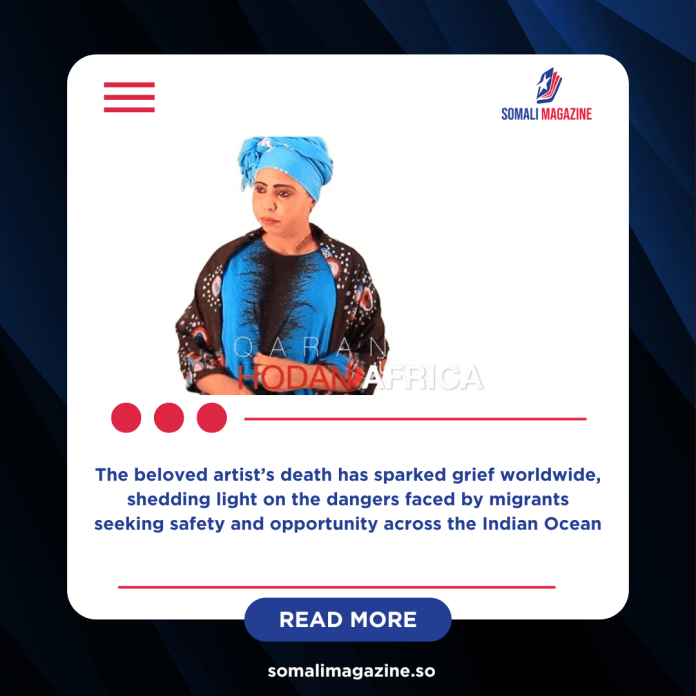Facebook Twitter (X) Instagram Somali Magazine - People's Magazine
Somali singer Hodan Aden, widely known as Hodan Afrika, has died along with her young daughter after a boat carrying Somali migrants capsized off the coast of Mayotte, a French island in the Indian Ocean. Authorities said the vessel was carrying more than 20 Somali migrants when it overturned while heading toward French territory. The exact number of people on board and the cause of the accident are still unknown.
Hodan, who had been living in Nairobi, Kenya, in recent years, was a beloved performer known across East Africa. She often sang for Somali communities in Kenya and beyond, her music blending nostalgia, love, and stories of migration. Fellow artist Abdulqadir Filfil, who worked closely with her, confirmed her passing and described her as “a brilliant voice who carried the soul of Somali music.”
The news of her death has deeply saddened fans and fellow musicians around the world. Tributes have flooded social media, with many remembering her for her powerful voice and her role in preserving Somali cultural identity through music. For many in the Somali diaspora, Hodan Afrika’s songs represented home — a connection to their roots despite being far from their country.
The tragedy occurred near Mayotte, a small island between Madagascar and Mozambique that has become a risky destination for migrants hoping for a better life. Although geographically part of the Comoros Islands, Mayotte chose to remain under French administration after a 2009 referendum and officially became France’s 101st department in 2011. This made it a magnet for migrants seeking entry into French territory and its social services.
Thousands of people from East Africa and the Comoros attempt the dangerous sea crossing to Mayotte every year, traveling in small, overloaded wooden boats known as kwassa-kwassa. Many of these journeys end in disaster, with boats sinking due to rough seas, poor construction, or overcrowding. Survivors often speak of leaving behind poverty, insecurity, or political instability in search of safety and opportunity.
This is not the first such tragedy involving Somali migrants. In late 2024, 24 people drowned off the coast of Madagascar when two boats carrying about 70 Somalis sank after mechanical failures. The Somali government later helped repatriate the survivors. Despite repeated incidents, many continue to risk their lives, driven by desperation and hope for a better future.
French authorities have faced increasing pressure to address the migration crisis in Mayotte. Earlier this year, French Interior Minister Gérald Darmanin visited the island and announced new measures aimed at tightening immigration controls, including limiting birthright citizenship for children born there. He argued that the island’s limited resources could not handle the continuous influx of migrants.
Even though Mayotte is officially part of France, it remains one of the poorest regions in the country. The majority of its estimated 300,000 residents are Muslim, and many struggle with unemployment, overcrowding, and lack of access to healthcare and education. Only about half the population is fluent in French, underscoring the deep divide between Mayotte and mainland France.
Hodan Afrika’s passing has highlighted the human cost behind these dangerous journeys — a reminder of the dreams, talent, and lives lost in pursuit of a better tomorrow. For many, her death symbolizes the struggles of countless migrants who leave home with hope but never reach their destination.

